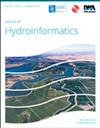通过结合物联网概念,开发了一种基于卷积神经网络的轻量级沉积物浓度预测视觉模型
IF 2.2
3区 工程技术
Q3 COMPUTER SCIENCE, INTERDISCIPLINARY APPLICATIONS
引用次数: 0
摘要
摘要沉积物浓度监测一直是水资源管理中的一个紧迫问题,但由于环境因素和仪器的限制,现有的许多仪器在准确测量中仍面临挑战。一种健壮的技术值得在现场应用。本研究首先使用平均绝对误差(MAE)、均方根误差(RMSE)、相关系数(CC)和纳什-苏特克利夫效率系数(NSE)来描述所提出的卷积神经网络(CNN)的性能。此外,采用集成学习概念来比较多种机器学习(ML)方法,CNN的预测准确率最高,为91%,优于SVM (79%), VGG19(63%)和ResNet50(35%)。因此,所提出的CNN框架可以很好地应用于监控需求。主要目的是开发一种简单、准确、稳定的SC监测技术。采用简单、小型的神经网络来实现实时应用(RTA),而不是一些复杂的体系结构。通过我们的设计,这样一个传统但关键的问题可以改善到一个新的状态。例如,通过将物联网(IoT)的概念与我们的设计相结合,可以快速轻松地实现大规模环境监测的分布式计算系统。本文章由计算机程序翻译,如有差异,请以英文原文为准。
Development of a lightweight convolutional neural network-based visual model for sediment concentration prediction by incorporating the IoT concept
Abstract Sediment concentration (SC) monitoring has always been a pressing issue in water resource management, as many existing instruments still face challenges in accurately measuring due to environmental factors and instrument limitations. A robust technology is worth presenting to apply in the field site. This study firstly uses mean-absolute-error (MAE), root-mean-square error (RMSE), correlation coefficient (CC), and Nash–Sutcliffe efficiency coefficient (NSE) to describe the performance of the proposed convolutional neural network (CNN). Moreover, adapting the ensemble learning concept to compare the multiple machine learning (ML) approaches, the CNN presents the highest predicted accuracy, 91%, better than SVM (79%), VGG19 (63%) and ResNet50 (35%). As a result, the proposed CNN framework can appropriately apply the monitoring needs. The primary purpose is to develop a simple, accurate, and stable SC monitoring technology. Instead of some complex architectures, a simple and small neural network is adopted to implement real-time application (RTA). Via our design, such a traditional but critical issue can be improved to a new state. For example, by incorporating the concept of the Internet of Things (IoT) with our design, the distributed computing system for large-scale environmental monitoring can be realized quickly and easily.
求助全文
通过发布文献求助,成功后即可免费获取论文全文。
去求助
来源期刊

Journal of Hydroinformatics
工程技术-工程:土木
CiteScore
4.80
自引率
3.70%
发文量
59
审稿时长
3 months
期刊介绍:
Journal of Hydroinformatics is a peer-reviewed journal devoted to the application of information technology in the widest sense to problems of the aquatic environment. It promotes Hydroinformatics as a cross-disciplinary field of study, combining technological, human-sociological and more general environmental interests, including an ethical perspective.
 求助内容:
求助内容: 应助结果提醒方式:
应助结果提醒方式:


